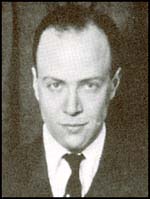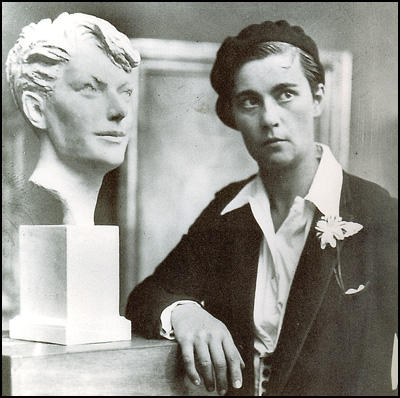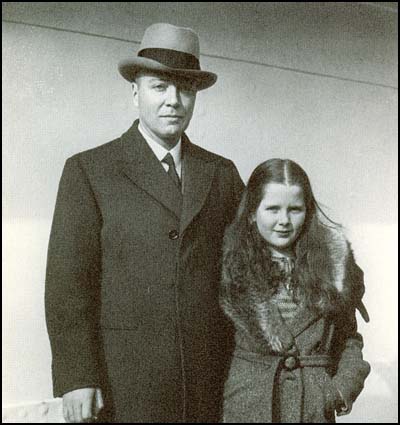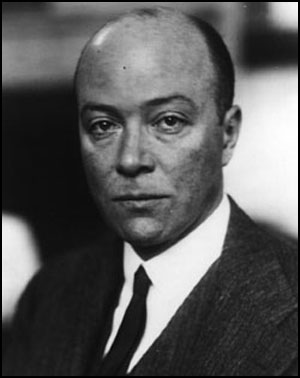William Christian Bullitt

William Christian Bullitt, the son of William Christian Bullitt, Sr. and Louisa Horowitz Bullitt, was born in Philadelphia on 25th January, 1891. His father was an executive with the Norfolk and Western Railroad and an investor in coal mines in Virginia.
Bullitt refused to go the elite boarding school of Gorton: "Every Gorton fellow I know is a snob" and instead attended the local Delancey School. He entered Yale University in 1908 and along with his friend, Cole Porter, was active in the Dramatic Association. He was said to have impressed his classmates with the "formidable intellect and the boundless energy he brought to almost every activity he took up." Bullitt also attended Harvard Law School but he "had almost no affinity and very little liking for the law" dropped out on the death of his father.
In 1914 Bullitt joined his mother on a tour of Russia but left on the outbreak of the First World War. Inspired by the success of muckraking journalists such as Lincoln Steffens and Upton Sinclair, on his return to the United States he became a $10 a week reporter for the Philadelphia Public Ledger. He was soon given his own column and it was claimed that he was "a descriptive writer whose racy and distinctly humorous articles have... given a hearty laugh to all Pennsylvania." In 1915 he was sent to interview Henry Ford about his attempt to bring about a negotiated end to the war. During this assignment he got to know John Reed, a journalist he had admired since reading his work in The Masses.
Bullitt became involved with the renowned beauty Ernesta Drinker in 1916. Her sister claimed "I have seen men catch their breath, looking at Ernesta" and it was pointed out by her mother that by the age of twenty-two Ernesta had received so many marriage proposals that she had stopped counting when the number reached fifty." They married in March 1916.
Bullitt took his wife with him when he was sent to Germany to cover the war. Walter Lippmann described him as one of "the sharpest of the American correspondents" and "his intuitions as to coming events... prove to be extraordinary accurate". George Kennan later recalled: "His was outstandingly a buoyant disposition. He resolutely refused to permit the life around him to degenerate into dullness and dreariness of spirit, this insistence that life be at all times animated and interesting and moving ahead."
Ernesta also took up writing and later published a book, An Uncensored Diary from the Central Empires. In November 1916 the couple returned to the United States and Bullitt became the newspaper's head of the Washington bureau. According to Mary V. Dearborn: "The power of this position - or perhaps its proximity to real power - acted on Bill almost as an intoxicant. Journalism was not a large enough sphere for him; he became impatient with writing editorials... Ironically, his reporting was more successful than ever - to the extent that rival papers hired a personal detective to follow him to see where he got his information."
In 1917 Ernesta Drinker Bullitt gave birth to a son, but the baby died after two days. For many months Bullitt had supplied information to Edward House, an important advisor to President Woodrow Wilson. In November 1917 House arranged for him to become assistant secretary of state, reporting to Joseph C. Grew, chief of the Division of Western European Affairs. During this period he was considered an expert on the Russian Revolution.
In December 1918 he went with the American delegation to the Versailles Peace Conference. Bullitt was strongly opposed to Allied intervention in the Russian Civil War. He told House that the prospect made him "sick at heart because I feel that we are about to make one of the most tragic blunders in the history of mankind". Bullitt wrote in his diary that "I know a lot of men who have been to Russia since the Revolution began, and they have all suffered conversion. They are done with Emperors. They have exiled the Czar. Taken over the banks... As a nation they have become brotherly, open-hearted, free from convention and unafraid of life." Ramsay MacDonald, the future British prime minister met him during this period and said that the "firmness of the man's enthusiasm made my heart ache when I met him first."
In January, 1919, Bullitt and his friend, Lincoln Steffens, argued that they should be sent to Russia to open up negotiations with Lenin and the Bolsheviks. Steffens said to Edward House: "You are fighting them, hating them... What for? Why, if you want to deal with them, don't you do as you would to any other government." Permission was granted by Secretary of State Robert Lansing on 18th February. Lansing wrote: "You are hereby directed to proceed to Russia for the purpose of studying conditions, political and economic, therein, for the benefit of the American Commissioners plenipotentiary to negotiate peace."
Justin Kaplan, the author of Lincoln Steffens: A Biography (1974): "Bullitt appointed as an unofficial member of the mission Lincoln Steffens, a known Bolshevik sympathizer and publicist. Bullitt's superiors might be outraged by the choice, but his reasoning at this point was unanswerable: he needed Steffens to vouch for him. American and British expeditory forces were fighting on the counter-revolutionary side in Russia; as far as Lenin's government was concerned the West had already declared war... The Russians trusted Steffens, knew that he was on their side and that he believed they were there to stay... As they left Paris, Bullitt and Steffens believed that they had been presented with a unique opportunity to make history by mediating between the West and the revolution."
Bullitt and Steffens had a meeting with Lenin in Petrograd on 14th March. Lenin later commented that Bullitt was a young man of great heart, integrity, and courage". It was agreed that the Red Army would leave "Siberia, the Urals, the Caucasus, the Archangel and Murmansk regions, Finland, the Baltic states, and most of the Ukraine" as long as an agreement was signed by 10th April.
Lincoln Steffens later commented: "It was a disappointing return diplomatically. Bullitt had set his heart on the acceptance of his report; House was enthusiastic, and Lloyd George received him immediately at breakfast the second day and listened and was interested. Of course. Bullitt had brought back all the prime minister had asked.... No action was taken on the proposal Bullitt had brought back from Moscow, and after a few weeks of futile discussion the Bullitt mission was repudiated. I heard that the French, having got wind of it, challenged Lloyd George; he and Wilson had gone back of the French to negotiate with the Russians, they charged. And Lloyd George took the easiest way out. He denied Bullitt in Paris, and when there were inquiries in London, he crossed the Channel to appear before the House of Commons... Bullitt tried to appeal to President Wilson. When Wilson would not see him."
After the terms of the Versailles Peace Conference was published Bullitt resigned in protest. He considered a betrayal of the men who had died during the First World War. On 17th May he wrote to President Woodrow Wilson, stating bitterly: "I am sorry that you did not fight our fight to the finish, and that you had so little faith in the millions of men, like myself, in every nation who had faith in you." Bullitt appeared before the Senate Committee on Foreign Relations and his testimony helped cause the treaty to be defeated in the Senate and the resignation of Robert Lansing.
George Kennan later commented: "I see Bill Bullitt, in retrospect, as a member of that remarkable group of Americans, born just before the turn of this century (it included such people as Cole Porter, Ernest Hemingway, John Reed, and Jim Forrestal - many of them his friends) for whom the First World War was the great electrifying experience of life. They were a striking generation, full of talent and exuberance, determined... to make life come alive. The mark they made on American culture will be there seems to have been a touch of the fate, if not the person, of the Great Gatsby... They knew achievement more often than they knew fulfillment; and the ends... tended to be frustrating, disappointed, and sometimes tragic."
William Bullitt divorced Ernesta Drinker Bullitt in 1923. Her sister said the marriage had been in trouble for sometime: "My sister's early ambition to marry a man who would let her argue with him did not materialize. With Bill Bullitt I think no woman, beautiful or ugly, could have held her own." The following year he married the journalist, Louise Bryant, the widow of John Reed, one of the founders of the American Communist Party.
Mary V. Dearborn, the author of Queen of Bohemia (1996) has argued: "What did Louise Bryant see in Bill Bullitt? At first, it seems, not much - beyond a pleasant dinner companion and a man in a position to help her. Jack Reed, so much admired by Bullitt, had never particularly liked him... Certainly Bill's politics, both before and after the peace mission, were in line with Louise's - though she and Jack may have had reservations because of his great wealth... With his retreat from the world of public affairs, Bullitt seemed to be turning his back on a life of propriety and convention. He would never exactly be bohemian, but he was iconoclastic enough to do what he pleased and defy the expectations of both of his tightly constructed social class and the status quo in general, a quality Louise would have fully appreciated."
Bullitt and Bryant spent time with Lincoln Steffens and his young girlfriend, Ella Winter, while they were living in Paris. Winter later wrote in her autobiography, And Not to Yield (1963): "We saw much of Louise Bryant and Billy Bullitt, Louise very pregnant in an Arabian Nights maternity gown of black and gold that I thought could have been worn by a Persian queen. Billy hovered over her like a mother hen." A daughter, Anne Moen Bullitt, was born in 24th February, 1924.
Justin Kaplan has argued that Bullitt was not an easy man to live with: "Bullitt was an emotional man, not always entirely rational. Indeed... Bullitt's faults were as excessive as his good qualities. Arrogance he possessed in great measure, as well as a sense of entitlement that went hand in hand with a belief in a levelling democracy. He was an impatient man, who, when he decided on a course of action, could not be swayed from it. He did not take advice well."
While in France he began work on a satirical novel about the wealthy people he knew growing up in Philadelphia. His biographer, Mary V. Dearborn, has pointed out: "The hero is John Corsey, a class-bound Philadelphia aristocrat who works as a newspaperman. He falls in love with the sculptor Nina Michaud, a character closely modeled on Louise, but marries Mildred, the socially proper woman his mother has chosen for him, who bears a distinct resemblance to Ernesta. Mildred is frigid, and an unhappy John is impotent. At the novel's end he rediscovers Nina, who has borne him an illegitimate son, a Communist rebel hero clearly based on Jack Reed."
It's Not Done was published in 1926. The New York Herald Tribune described it as "a triumph of audacity" and a "tour de force". The New York Times claimed that it was "a propaganda novel, directed against a single institution, the American aristocratic ideal, and whose defect is that the smoke does not quite clear away so that one can accurately count the corpses." Several reviewers commented on the "frank sexual discussions and steamy love scenes". It was a great commercial success, selling more than 150,000 copies and going into twenty-four printings.
Bullitt's marriage to Louise Bryant did not always run smoothly. The historian, Kenneth S. Davis, claimed that Bullitt was not an easy man to live with: "Ardent, charming, brilliant, highly emotional, a romantic idealist of conspiratorial temper for whom everything was purest white or deepest black (from the first to last he had an excessively vivid sense of plot and counterplot going on all around him), he had several characteristics of the spoiled rich boy who won't play if he can't make the rules."
Bullitt also objected to Bryant's heavy drinking, especially as he felt it was damaging her ability as a mother. On 28th September, 1929, Bullitt discovered letters that indicated that Bryant was having a sexual relationship with the sculptor Gwen Le Gallienne. When confronted with this information, Bryant attempted suicide by taking an overdose of sleeping pills and was admitted to the Neurological Institute of New York. Soon afterwards Bullitt obtained a divorce and gained custody over his daughter, Anne Moen Bullitt, following his testimony that his wife was having a lesbian relationship with Gallienne.

In 1933 President Franklin D. Roosevelt appointed Bullitt the first US ambassador to the Soviet Union. He was sent to Moscow because Roosevelt hoped that it would be remembered for his attempts to negotiate a peace treaty with Lenin in 1919 and his protest resignation after President Woodrow Wilson rejected his proposals. Bullitt was recalled in 1936 when it was disclosed by journalist Donald S. Day that he had been involved in foreign exchange irregularities. It was later claimed that Day was working as a Nazi agent.
Bullitt was posted to France in October 1936 as Ambassador. Bullitt was especially close to Léon Blum and Édouard Daladier and was considered by Roosevelt to be an important source of information on French politics. After the German invasion of France in May 1940, Bullitt remained living in Paris. Roosevelt was furious with Bullitt as he believed he should have gone with the French government to Bordeaux to look after US interests. Bullitt was now replaced by William D. Leahy.

Bullitt returned to the United States and in 1941 he further upset Roosevelt by providing evidence that Under Secretary of State Summer Welles had made homosexual propositions to a pair of railroad porters. Roosevelt refused to sack Welles and he told his son, Elliott Roosevelt, that he believed that Bullitt had bribed the porters to make overtures to Welles to entrap him. Bullitt now took his story to Vice President Henry A. Wallace. Roosevelt told Wallace that Bullitt ought to "burn in hell" for what he was saying about Welles.
Bullitt refused to be beaten and passed on the information to Senator Owen Brewster, a long term enemy of Roosevelt. Fearing a political scandal, Roosevelt talked to Welles about what was happening and he resigned on 30th September, 1943. Roosevelt refused to give Bullitt another post because of his campaign against Summer Welles. When he attempted to become Mayor of Philadelphia, Roosevelt secretly told the Democratic Party leaders in the city to "cut his throat" and as a result Bullitt was defeated.

After the Second World War Bullitt became a leading Cold War warrior. In an article published in Look Magazine on 24th August, 1954, he proposed an immediate attack on Communist China and asserted that the United States should "reply to the next Communist aggression by dropping bombs on the Soviet Union."
William Christian Bullitt died in Neuilly, France on 15th February, 1967, and is buried in Woodlands Cemetery in Philadelphia.
Primary Sources
(1) George Kennan, William Christian Bullitt (1972)
I see Bill Bullitt, in retrospect, as a member of that remarkable group of Americans, born just before the turn of this century (it included such people as Cole Porter, Ernest Hemingway, John Reed, and Jim Forrestal - many of them his friends) for whom the First World War was the great electrifying experience of life. They were a striking generation, full of talent and exuberance, determined... to make life come alive. The mark they made on American culture will be there seems to have been a touch of the fate, if not the person, of the Great Gatsby... They knew achievement more often than they knew fulfillment; and the ends... tended to be frustrating, disappointed, and sometimes tragic.
(2) Lincoln Steffens, Autobiography (1931)
"So you've been over into Russia?" said Bernard Baruch, and I answered very literally, "I have been over into the future, and it works." This was in Jo Davidson's studio, where Mr. Baruch was sitting for a portrait bust. The sculptor asked if I wasn't glad to get back. I was. It was a mental change that we had experienced, not physical. Bullitt asked in surprise why it was that, having been so elated by the prospect of Russia, we were so glad to be back in Paris. I thought it was because, though we had been to heaven, we were so accustomed to our own civilization that we preferred hell. We were ruined; we could recognize salvation, but could not be saved.
And, by the way, it was harder on the real reds than it was on us liberals. Emma Goldman, the anarchist who was deported to that socialist heaven, came out and said it was hell. And the socialists, the American, English, the European socialists, they did not recognize their own heaven. As some will put it, the trouble with them was that they were waiting at a station for a local train, and an express tore by and left them there. My summary of all our experiences was that it showed that heaven and hell are one place, and we all go there. To those who are prepared, it is heaven; to those who are not fit and ready, it is hell.
It was a disappointing return diplomatically. Bullitt had set his heart on the acceptance of his report; House was enthusiastic, and Lloyd George received him immediately at breakfast the second day and listened and was interested. Of course. Bullitt had brought back all the prime minister had asked. And that same morning I was received and questioned, very intelligently, by "British information, Russian section." I had learned to despise the secret services; they were so un- and mis-informed; but these British officers knew and understood the facts. They asked me questions which only well-informed, comprehending, imaginative minds could have asked, and my news fitted into their picture. All a long forenoon they probed and discussed and understood so perfectly that when I was saying good-by at noon I begged leave to compliment them and to contrast their British information with our American secret service. And, by way of a true jest, I said to them: "You have proved to me that my government is honest and that yours is not."
"But why that?"
"Well," I said, "your government, like mine, talks lies, but evidently your government knows the truth. Mine does not. My government believes its own damned lies; yours doesn't."
No action was taken on the proposal Bullitt had brought back from Moscow, and after a few weeks of futile discussion the Bullitt mission was repudiated. I heard that the French, having got wind of it, challenged Lloyd George; he and Wilson had gone back of the French to negotiate with the Russians, they charged. And Lloyd George took the easiest way out. He denied Bullitt in Paris, and when there were inquiries in London, he crossed the Channel to appear before the House of Commons to declare explicitly and at length that he knew nothing of the "journey some boys were reported to have made to Russia." I have had it explained to me since that this is not so weak and wicked as it seemed to us. It was a political custom in British parliamentary practice to use young men for sounding or experimental purposes, and it was understood that if such a mission became embarrassing to the ministry, it was repudiated; the missionaries lay down and took the disgrace till later, when it was forgotten, they would get their reward. But Bullitt would not play this game. He tried to appeal to President Wilson. When Wilson would not see him I remembered the old promise to me after the Mexican affair to receive me if I should send in my name with the words, "It's an emergency." I did that, and my messenger, a man who saw the president every day, described the effect.
